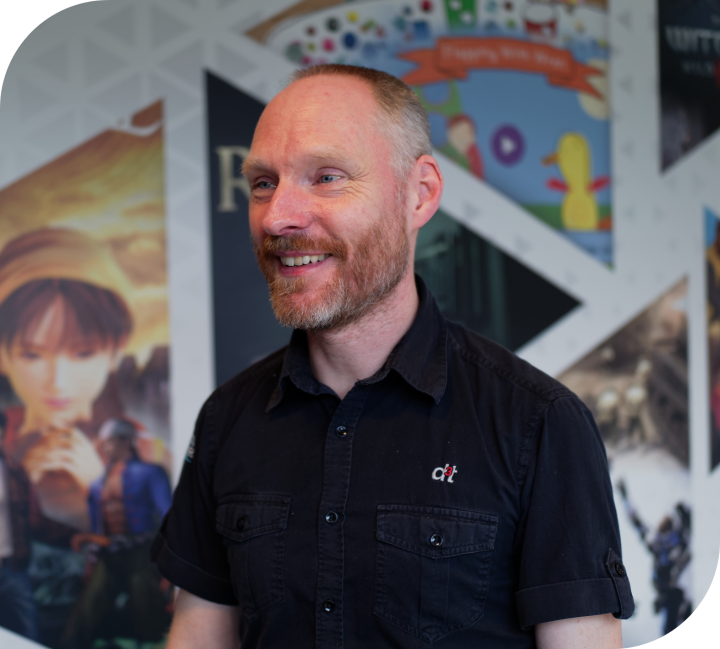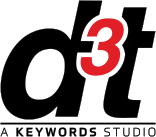Spotlight: Hal Sandbach, Head of Design
11th Dec 2023

- How long have you been in the industry?
Since April 1997. I’ve stopped counting how many years that is. - How long have you been with d3t?
I joined d3t in December 2015. It’s been quite the ride and I regret nothing. - What was the first game that you worked on?
My very first job was with Psygnosis. The team I joined was working on a game called “The Contract”, but it never saw the light of day. The first game I worked on which made it to the shelves was the PC version of ToCA2.
How did your career begin within the games industry?
Back when this was all fields, there were no games design courses that I was aware of. My degree was in Business Law, which is clearly a perfect fit.
But a good friend of mine from school did Computer Science (I think it was) and got a job at Psygnosis after his degree. He recommended I apply, and this was successful. And so it began. He’s now working at d3t too, coincidentally, and is brilliant.
How did you get your job at d3t?
I was made redundant by Sony in 2015, and joined d3t at the end of that year through an agency.
What is it like working at d3t?
I’ve worked for Psygnosis, Codemasters, Warthog, and Sony. I can honestly say that d3t is easily the best of them.
The difference is the culture, and how d3t treats the people here. It is the most genuinely people-first organisation I have experienced.
The impact of this is that throughout the company there are real efforts and initiatives to help people thrive. And in doing so, we get really talented people demonstrating their abilities.
As a Head of Design, what do you typical day-to-day activities consist of?
There are 4 things I do most: talk to people, listen to people, react to events, and plan for the future.
Gone are the days when I actually do design work on a project. Instead, most days I will have at least one scheduled discussion with a designer here at d3t, to see how they’re doing on the project, what’s going on in their lives, how they may be progressing in their career goals etc.
I have plenty of meetings about project status and progression, what upcoming projects we might be preparing for, and discussions about plans or initiatives at a company level.
We always have a number of different projects running, so I try to go to at least one stand up meeting every day – ideally more – so that I get to say hi to some of the team.
What are the current games design challenges we face and how are we overcoming them?
Some older game design challenges come with a brand new mask. Keeping a player engaged is the core to what designers do. So that’s always the underlying question.
But upon that, there are new and interesting things to throw you off your design stride. The “big” games are getting bigger. Having a bigger game doesn’t necessarily mean the actual player engagement is better – a longer playing time means you need more innovation to avoid repetition. But there are also increasing numbers of smaller games, based perhaps around unexplored ideas or concepts. Keeping up with this is a whole new challenge – possibly impossible for one individual.
AI is obviously a challenge, but potentially a great opportunity. Utilising these opportunities is something we, and lots of others, are exploring. Probing what it’s good at, and what it struggles with, is very revealing.
What are the things that excite you most about your role?
As I mentioned, my role is no longer to act as a designer. But I can still appreciate great design and help the other designers in that area.
But what’s most exciting and rewarding about being the Head of Design is being able to help shape the path of d3t – which projects to go for, what training would be most useful, seeing people surpass my, and their own, expectations.
Having worked for a number of games companies, I’ve seen good and bad processes. Being able to pick the best and see them in action to make d3t a really rewarding place for everyone – that’s the best thing.
What has been the biggest challenge you’ve faced whilst in the industry and how have you overcome it?
I’m very pleased there has been a significant shift in mindset regarding what is acceptable to expect from people regarding working hours. Crunch was difficult. It put strain on personal and mental health, as well as relationships and families. It can only be a good thing that the industry seems to, on the whole, have a greater understanding of this.
Our working model means that it doesn’t make sense to stress the team through overtime. Having this as a principle within d3t is great.
What has been your most memorable moment working within the industry/or at d3t?
At Develop in 2022, over the course of one day, or perhaps two, we learned we won both the Best Places to Work and the Best Creative Provider awards. That was great because it meant not only our people valued the culture and ethos of the company, but also the output was top quality. That was a good day.
Where do you see games design heading in the next 2-3 years?
There’s been a movement towards greater specialisms in design. In the first few years of my career, I did scripting, level design, systems, narrative, and possibly more that I can’t remember. But as games get bigger, so do the teams. And that allows people to really get into the minutiae of different elements. Being able to find a niche that really fits an individual’s talents and passion can be a wonderful thing.
Obviously AI has the potential to impact how much a designer is able to produce. From what I’ve seen of the current AI systems, the output is pretty generic, but I imagine that will change. As so many developers use Unreal, an AI that can create Blueprints, even if they’re quite basic, will give a huge head start to designers.
What makes you proud to work at d3t?
Our commitment to making a successful games company that treats the employees well. Being part of the senior leadership team, I can honestly say that the discussions we have are genuinely aimed at helping our team. The quality of the work we create is a direct result of the quality of the people.
What advice would you give to anyone looking to get into the games industry as a Designer?
I think anyone whose job revolves around being creative benefits from absorbing stories, perspectives, songs, information etc from as many different sources as possible. We can only create from what we know, so the more we know, the wider our possible creative output. I would heartily recommend watching films, reading books, going to the theatre, visiting museums, listening to music – especially if it’s outside your current sphere of knowledge.
Personally, I get great value from understanding brains. Having insight into how brains work helps us anticipate how players will act, and react. This is why I put time into the psychology of games and game design.
Any other points that you’d like to share?
Something I have noticed, particularly from designers within their first couple of years in the industry, is that there is a lot of self-inflicted pressure. The perceived need to be perfect, possibly as a result of imposter syndrome, can be quite debilitating. So for anyone in this situation, I would heartily recommend they realise that nobody gets things right first time. Any creative process is mainly iteration, and so having the freedom to allow yourself to adopt this mindset is very liberating.
We are hiring
Stay tuned for more spotlight features coming soon. In the meantime, if you’re feeling inspired and want to join our team, check out our vacancies page!

